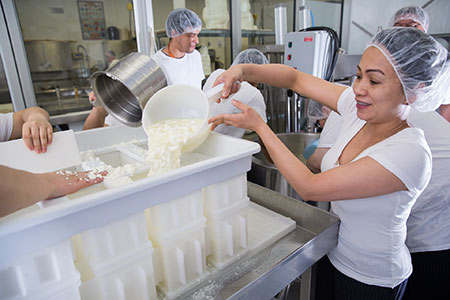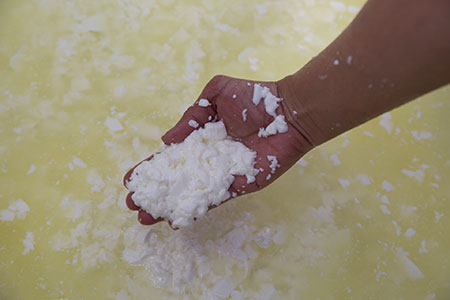A new initiative promotes richer cheeses and industry growth
Allan Roote’s dream of making a better gouda is finally within reach.
For several years, the Culinary Arts instructor and head of NAIT’s Artisanal Cheese Fundamentals Project has envisioned making his own Dutch cheese that is “semi-soft to the touch, a little bit silky to the touch” and has “a very pleasant aroma, and a slight auburn-yellowish colour to it.”
 Now, thanks to Alberta Milk, the province’s association for dairy producers, he has access to the perfect gouda’s secret ingredient: unprocessed milk delivered direct from the farmer.
Now, thanks to Alberta Milk, the province’s association for dairy producers, he has access to the perfect gouda’s secret ingredient: unprocessed milk delivered direct from the farmer.
This March, Alberta Milk (which helped fund the project with the former Alberta Livestock and Meat Agency) issued a processor licence to NAIT to use raw milk, which has not been homogenized or pasteurized by the dairy industry.
“Using raw milk [allows us] to experiment with whatever recipe, whatever kind of cheese we want to make,” Roote says. It can be used to produce a wider range of, and often more flavourful, cheeses.
As he sees things, it may even create new opportunities for the province’s cheese-making industry. “We have so much product to use,” he says. “We just don’t have enough processors.”
Why raw milk makes a difference
Roote started NAIT’s artisanal cheese initiative in 2009 with a desire to learn how cheese was made and to foster awareness among students in the Culinary Arts and Continuing Education programs about where our food comes from.
At first, he was content with a processor’s licence to make cheese using pasteurized, homogenized cow’s milk from grocery stores. He used it to make high-quality cheeses in the styles of feta, mozzarella, brie, cheddar and pecorino. It’s regularly sold in the polytechnic’s Retail Meat Store (open from September to April), used in Ernest’s, the on-campus fine-dining restaurant, and in Culinary Arts classes.
But Roote couldn’t use store-bought milk to make a variety of other cheeses, including a decent gouda. “It didn’t mat together,” he says. “It was dry, it was dense and it didn’t melt. It was just terrible.”
Because it’s not homogenized or pasteurized, raw milk may change this.
Homogenization breaks fat into smaller particles so that the cream will not separate from the milk. This can affect texture and flavour of cheese. Pasteurization, which briefly heats milk to a high temperature to kill harmful bacteria, may do the same.
While raw, unhomogenized milk that NAIT receives from Edmonton dairy farms still needs to be pasteurized (63 C for 30 minutes) to meet Alberta’s Dairy Industry Act standards, Roote prefers controlling the process himself. Store-bought milk may be over-pasteurized, killing the “good” bacteria that are responsible for the depth of flavours found in raw milk cheeses.
Having a raw milk licence is unusual for a learning institution such as NAIT. Getting it took time, says Roote. It required new and costly equipment, as well as establishing new operating and sanitization procedures specific to raw milk. He believes the outcome will be worth the effort.
For the love of cheese
 One reason for this is simply his love of cheese and of the craft of making it. It’s part science, part art and part luck, says Roote.
One reason for this is simply his love of cheese and of the craft of making it. It’s part science, part art and part luck, says Roote.
"When you are making artisan cheese you don’t know exactly what’s going to transpire or come out of it until you actually cut into it – which is the beauty of it.” From having spoken with other cheese-makers, though, he knows that using raw milk will lead to better products.
The other reason Roote is pleased with the licence is that it’s another step toward meeting demand for new, innovative, local cheeses in the province.
Denise Brattinga (Management ’84), finance and policy manager with Alberta Milk, says that Albertans are one of Canada’s largest consumers of specialty cheese. Annually, they devour an average of 6.1 kilograms of unprocessed cheese per person, compared to 5.9 kg nationally.
With consumers looking for greater variety, Brattinga says that Alberta Milk is pleased NAIT’s artisanal cheese-making project has the ambition to meet the changing needs of Albertans and Canadians.
“Albertans value local products and it doesn’t get any more local than this,” says Brattinga. Since there are only 7 cheese manufacturers in Alberta, she feels that the expansion of NAIT’s cheese-making program to include raw milk could lead to growth in the artisanal producer community.
Roote recently began paving the way for that by producing – you guessed it – a gouda made with raw milk. Soon, he’ll follow that with styles of cheeses that include cheddar, havarti, gruyere, caerphilly, brie and feta. He hopes he’ll be able to raise interest in doing the same among would-be producers.
“If we can only get some more cheese-makers in the province of Alberta, or even in the Western provinces, the more the merrier,” he says. “To me that would be a win-win.”